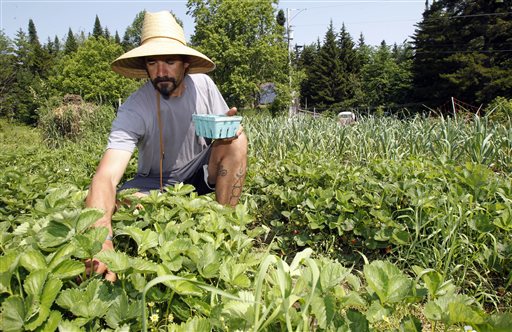By LISA RATHKE
Associated Press
WAITSFIELD, Vt.
Some Vermont farmers want to plant hemp now that the state has a law setting up rules to grow the plant, a cousin of marijuana that’s more suitable for making sandals than getting high.
But federal law forbids growing hemp without a permit, so farmers could be risking the farm if they decide to grow the plant that the Drug Enforcement Agency basically considers marijuana.
Hemp and marijuana share the same species _ cannabis sativa _ but hemp has a negligible content of THC, the psychoactive compound in marijuana. Under federal law, all cannabis plants fall under the marijuana label, regardless of THC content.
To grow marijuana for industrial purposes or research, a grower must register with the DEA and meet specific security requirements, such as installing costly fencing for a field of hemp.
A national nonprofit group is pushing to change current law and move regulation of hemp farming from the DEA to the state. In the meantime, the group, Vote Hemp, does not recommend growing hemp while state and federal laws conflict.
Murphy said he’s heard that people have planted hemp on leased land in Colorado.
So far, 19 states have passed hemp legislation, including nine that allow its production. Eight states have passed bills calling for the study of hemp, while three states passed bills setting up commissions or authorizing the study of it, according to Vote Hemp.
The states hope to nudge the federal government to change its law.
John Vitko would like to grow hemp on his Vermont farm to use as feed for his chickens now that Vermont has passed a law setting up rules to grow it. He doesn’t know where to find any seed and knows he would be breaking federal law if he finds some and grows a small amount of the plant.
With the cost of feed continually rising, he said hemp provides an economical way to feed and provide bedding for his 100 birds, whose eggs are used in the custard-based ice cream he sells to restaurants and in a dessert shop in Waitsfield.
Hemp has been grown in the U.S. in the past to make rope, fabric and even the paper that used to draft the Declaration of Independence. The country even launched a “Hemp for Victory” campaign during World War II as supplies for other overseas fibers dwindled.
Now most hemp products in the U.S. are imported from Canada, China and Europe and some farmers think the U.S. is missing out on a lucrative crop.
U.S. Rep. Jared Polis of Colorado was granted a request to fly an American flag made of hemp over the capitol in Washington on the Fourth of July. He held the flag during the U.S. House debate in over a hemp amendment to the farm bill that he introduced with Republican Rep. Thomas Massie of Kentucky and Democratic Rep. Earl Blumenauer of Oregon. The measure would have allowed colleges and universities to grow hemp for research in states where its cultivation is permitted. The amendment passed but the farm bill failed.
The figure Blumenauer referenced comes from a Congressional Research Service report that says the industry estimates that U.S. retail sales of hemp-based products may exceed $300 million per year.
The bill that Democratic Vermont Gov. Peter Shumlin signed into law last month is intended to push the federal government to change its law after Canada reintroduced industrial hemp in the late 1990s.
The Vermont law sets up procedures and policies for growing hemp. A grower must register with the state agriculture secretary and provide a statement that seeds used do not exceed a certain concentration of THC.
The grower also must allow the hemp crops to be inspected and tested at the discretion of the Agriculture Agency, which warns growers that cultivating and possessing hemp in Vermont is a violation of federal law.
It’s too late this growing season in Vermont for Vitko to grow hemp, but he hopes to plant just an acre of the plant next spring if the rules are worked out.

COMMENTS
Please let us know if you're having issues with commenting.